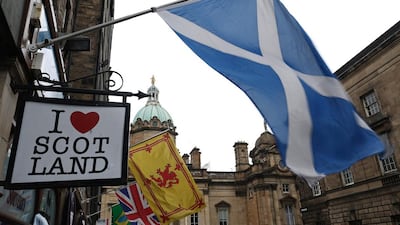Three months after rejecting independence in a historic referendum, the Scottish nation seems as restless as ever. The No campaign, which won by a margin of 55 per cent to 45 over their nationalist rivals in September, had hoped that their victory would bury the spectre of Scottish independence.
Yet, as membership of the Scottish Parliament’s ruling pro-independence Scottish National Party (SNP) closes in on the 100,000 mark – four times what is was on referendum day – opinion polls suggest the party will make considerable gains in next year’s UK general election. Far from being a lost cause, Scottish independence has become a cause not yet won.
Alex Salmond, Scotland’s former first minister and SNP leader, is still at the forefront of the independence charge. If his political opponents hoped that Mr Salmond would fade into the background, then his announcement earlier this month that he will stand as an MP in next year’s Westminster election put paid to any notions of a prolonged personal crisis of confidence.
Mr Salmond, who took his country to the brink of statehood, has sensed an opportunity to take the fight for Scottish independence to the heart of the British establishment. Those who fought him during the referendum campaign almost let out a collective groan as Mr Salmond stated his aim to mix it up in parliament in what would be his third stint in Westminster.
With Scotland’s media also taking advantage of the nation’s new-found political landscape – a new pro-independence quality newspaper called (coincidentally) The National, was founded just weeks ago – Mr Salmond is looking to expose a befuddled Unionist alliance that may have won the referendum, but lost large parts of Scotland.
Indeed, as Nicola Sturgeon, Scotland’s new SNP first minister, went on a speaking tour of the nation, pro-Union Scottish Labour were trying to come to terms with the resignation of their own leader and the loss of their core vote. Once loyal voters have drifted away from Labour following the party’s decision to campaign alongside their bitter Conservative rivals in the referendum.
Mr Salmond also knows that while the referendum was lost, the margin of defeat was small.
A hefty loss would almost certainly have consigned the independence debate to the political scrapheap. But, while two million cast their votes in favour of retaining the union, the 1.6 million who voted for a sovereign Scottish nation are showing little sign of quietening down. The former premier will be relying on their support to win a seat in north-east Scotland.
When Mr Salmond announced his intention to step down from the role of first minister in September, he spoke of his plan to “hold Westminster’s feet to the fire” concerning the London-led promise of offering substantial new powers to the Scottish parliament in the event of a No vote.
As these power proposals make their way through the Westminster machinery, the man who is considered one of the most skilful operators in British politics will be itching to ensure that London is always reminded that the future of Scotland is far from settled.
Alasdair’s new book, In The Shadow Of The Cotton Tree, is out now
On Twitter: @AlasdairSoussi

